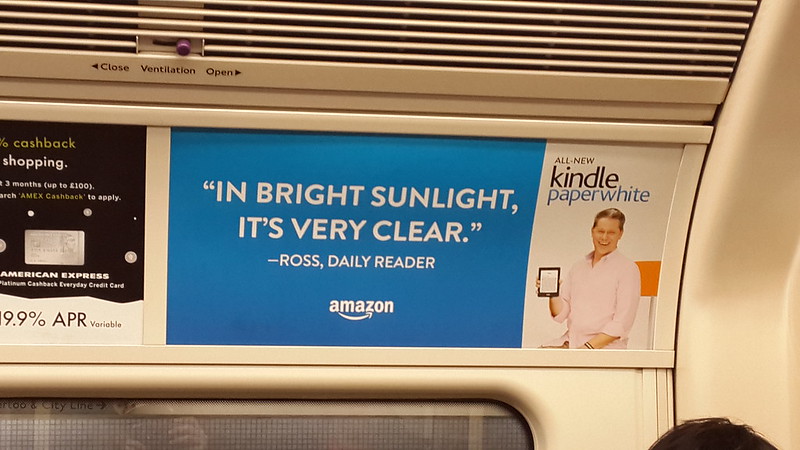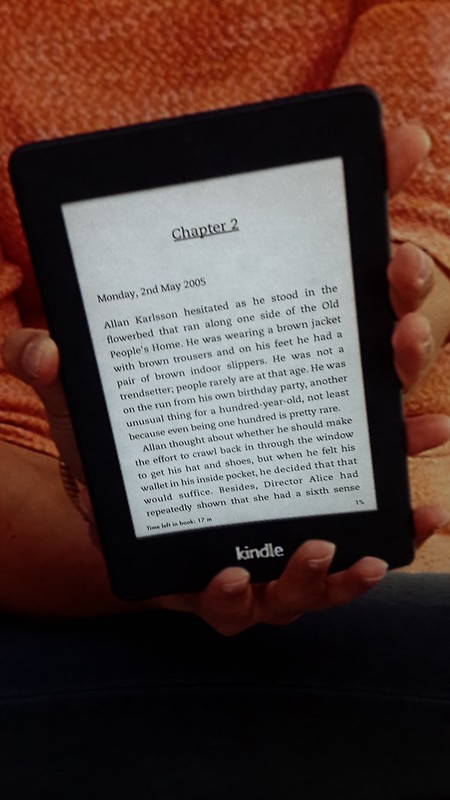
The other day, I noticed that everyone on the Amazon Kindle Paperwhite adverts on the London tube (spotted along the Victoria Line and Jubilee Line) is actually reading the same book. You know those adverts where they have someone waving a Kindle and spouting something along the lines of "OH MY GOD I CAN READ IT AND ITS LIKE PAPER"? Yes. The book on screen in all of those ads is exactly the same! A simple search later revealed that the book in question was "The Hundred-Year-Old Man Who Climbed Out of the Window and Disappeared" by Jonas Jonasson. I wonder, did Jonas Jonasson or his publisher get a cut from doing this "spot"? I always look at books in display cases to see what they thought should be their mannequin's reading material. Has anyone else noticed that they put exactly the same book in every picture?
Curious as to how this book was selected, when I googled for information relating to "The Hundred-Year-Old Man" and its relationship to Amazon Kindle, the most prominent fact that seemed to come to the fore was that earlier this year the kindle version of the book had actually been sold for the staggeringly low price of 20p at one point. TWENTY PENCE! FOR A BOOK! Now I have not yet read the book, but the very idea of selling a book for 20p (0.40 SGD) naturally arouses suspicion that perhaps the book was a gimmick or had something seriously wrong with it to the point that they had to sell it for 20p to move those units. Perhaps it could even be a trashy novel with popular appeal like Fifty Shades of Grey. (Incidentally, there is also a parody novel called Fifty Sheds of Grey which is also on Kindle's 20p list). But a quick google of the book seems to indicate that it is a serious real book. In fact now it is now listed as being back to a 'normal' price of £3.99 on Amazon UK.
I think one tends to be immediately outraged to hear that any real books have been priced at 20p; I would be inclined to assume first that the person who has taken the cut must be the author or publisher rather than the massive e-retailer. But, in this case it was actually Amazon and Sony which had absorbed the cost of the book in the bid to attract more people to their e-book handsets. Turns out the 20p gimmick was simply a result of Amazon attempting to price-match Sony's discounts on those same books.



Even if the author or publisher does not suffer financially from such a move, it seems like a very bad thing to value a book at something as low as 20p; like a a perfunctory token. Even if they are only to be temporarily priced at 20p, I wonder if in the long write people may come to expect that books CAN be expected to be valued at such prices in future. It is one of those things, like how writers often find that they do not get paid as much as they should do - when in actual fact all the content and meaning is in the writing itself! I do find it ludicrous that a designer and printer can always expect to get paid on time because they produce tangible deliverables, but something like being a copyeditor/writer is sometimes times harder to define and assign value to, when in fact it could very well be the most important part of the process! It seems like a bit of a mean-spirited thing to have a price war over e-books in particular - the thing is that they do not have a physical form, so the way in which we attach a price tag to them could in fact be completely arbitrary. The whole system and economy of the pricing of e-books could go either way right now, and I dislike the notion of a "price war" because I think you should either have it at a reasonable price (but then what would that be?) or completely free, rather than leveling it as CHEAP and almost worthless.
I think that in an ideal world, all e-books should be free because it is already in a format that cannot be controlled - in any case if consumers are used to not paying for e-books then it will be hard to ever re-institute prices on e-books after the precedent has been set on "selling" e-books for practically just pennies. Consequently, all printed books should understood to be sold at a price that must come at a reasonable premium because there is an inherent respect amongst people for the print format of the book. Logically, over time, as digital platforms become more and more prevalent but also cluttered and full of "noise" (due to the oversaturation of media and advertising) it will eventually become more and more desirable to have a physical, tangible form of a book that we can hold and touch and experience - the same way old physical playback formats like VHS and vinyl persistently retain a distinctive appeal despite there being many new digital methods of recording, playing, and distributing/selling music. On top of that, in an ideal situation, all readers should be educated and discerning of what they choose to read or not read. E-books in the public domain or which are offered for free do not pose a threat to the commercial viability of new books because people always desire good, intelligently written and fresh new literature to read and consume, and it will be commonly understood that this comes at a cost because of the immense amount of work, time, energy and authorial brilliance that is necessary to produce new literature.
Very comforting for a writer to read. Georg
ReplyDelete